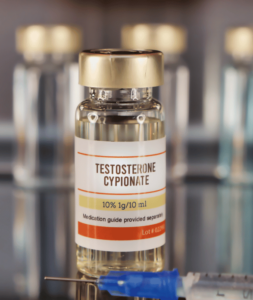Have you ever gotten the feeling that damn near every conversation about men’s health starts with a problem and ends with a prescription? You’re not alone. From low energy to stress to aging, it seems like there’s always a medical label and a pill waiting to “fix” whatever you’re dealing with. But here’s the thing: not everything needs a pharmaceutical solution. Sometimes, we’re better off looking at the bigger picture, and we’re certainly missing a piece of the puzzle if we aren’t solving for the root cause.
This isn’t about abandoning or bashing modern medicine. It’s about questioning why we’ve come to see so many aspects of health as medical problems instead of parts of the human experience that we need to take responsibility for. As a holistic health coach who works to fill in these gaps, I’m here to share some thoughts on how we can shift the narrative and take back control of our wellness.
What Is the Medicalization of Men’s Health?
So yeah, let’s break it down: medicalization is when everyday experiences, like feeling tired or stressed, are reframed as medical conditions. Suddenly, you’re not just tired – you have low testosterone. You’re not just stressed – you have an anxiety disorder. While these diagnoses can be valid and even life-saving, the problem is when they’re overapplied or used to sell quick fixes.
For example, think about the huge rise in testosterone replacement therapy (TRT) we’ve seen over the last few years. Ads and billboards promise they’ll fix your low energy, your weight gain, and your lack of motivation. But often, what’s really happening is burnout, metabolic dysfunction, poor sleep, and/or a lifestyle that’s out of balance with what our system needs to perform at a decent level. By jumping straight to medical solutions, we do so at the risk of chasing symptoms while ignoring the root causes and, in turn, perpetuating the underlying issues.
The same goes for mental health. Feeling overwhelmed by life? Instead of exploring stress management, exercise, or better boundaries, the first suggestion you get might be Xanax. Depressed? Oh yeah, you just might have been born with a deficiency of Lexapro – ain’t nature wild?
Listen, sarcasm aside, there’s certainly a place for medical intervention, but it’s worth asking: Where is that place? And what else can we do to support ourselves?
How Did We Get Here?
The medicalization of men’s health didn’t happen overnight. It’s the result of a few big cultural shifts:
- Marketing Meets Medicine: Over the years, pharmaceutical companies realized they could market directly to consumers. Ads for medications started showing up everywhere, making it seem like every problem had a prescription. Prescription drug advertising is actually only allowed direct-to-consumer in the United States and New Zealand. In the U.S., the surge of consumer drug ads on television began in 1997, following the FDA’s decision to loosen its guidelines for broadcast media.

- Cultural Expectations: Society often expects guys to be strong, self-reliant, and tough. That can lead to ignoring health issues until they become seriously unavoidable – and by then, it’s a lot more likely that medical treatment feels like the only option.
- Quick Fix Culture: We live in a world that loves instant solutions. Why spend months working on lifestyle changes when you can take a pill and feel better tomorrow? The problem is, quick fixes rarely address the underlying issues.
These factors have created a perfect storm where health challenges are seen as things to be “fixed” rather than managed, understood, or even solved. And that’s where a holistic perspective can make a huge difference.
Why It Matters
At first glance, medicalization might not seem like a big deal. If there’s a solution, what’s the harm? The issue is that over-medicalizing men’s health can lead to some serious downsides:
- Masking the Root Cause: Medications often treat symptoms, not the underlying problem. For example, taking testosterone might help with energy in the short term, but if the real issue is poor sleep or chronic stress, you’re not solving the problem.
- Dependency: Relying on medications can sometimes create a cycle of dependency. Instead of learning to manage your health naturally, you’re tied to a prescription.
- Lost Empowerment: When we’re too quick to medicalize, we’re essentially outsourcing our health. That can leave us feeling powerless instead of in control.
By stepping back and looking at the big picture, we can reclaim our health and make choices that support long-term wellness.

A More Holistic Perspective on Men’s Health
So, what does it look like to take a more holistic approach to men’s health? It starts with focusing on the foundations of wellness – the stuff that might not be flashy or convenient in the short-term but makes a huge difference over time.
Nutrition
Food is the cornerstone of health. What you eat affects your energy, mood, and even how well your body recovers from stress. Instead of jumping to supplements or medications, start by asking: “Am I fueling my body with what it needs?”
- Prioritize whole foods like vegetables, fruits, lean proteins, and healthy fats.
- Cut back on processed foods and added sugars, which can mess with your energy and hormones.
- Stay hydrated – sometimes, fatigue is as simple as not drinking enough water.
Exercise
Movement is about more than just looking good. It’s about feeling strong, capable, and alive. Regular exercise can improve mood, boost energy, and even help with mental clarity.
- Find something you enjoy, whether it’s lifting weights, running, swimming, or playing pickup basketball at the local park or gym.
- Make it consistent. Even 30 minutes a day can make a big difference over time, especially if you’re not currently doing anything.
Sleep
Sleep is when your body repairs itself. If you’re not getting enough, it can throw everything off – from your energy levels to your hormones.
- Aim for 7-9 hours of quality sleep each night.
- Create a bedtime routine to wind down – no screens, no stimulants, no stress.
- Keep your bedroom dark, quiet, and cool.
Stress Management
Stress is unavoidable, but how you handle it can make or break your health. Instead of letting it pile up, find ways to release and reset.
- Try mindfulness practices like meditation or deep breathing.
- Get outside – nature has a way of calming the mind and giving us perspective that helps us in all aspects of our lives.
- Talk to someone you trust about what’s bothering you – coach, therapist, mentor, neighbor, whatever. Bottling it up only makes it worse.

When Medicine is the Right Call
Just to be clear: there are times when medical intervention is necessary. If you’re dealing with a serious condition, medications and treatments can be lifesaving. The key to what we’re going for here is balance – using medicine as one tool in your health toolkit, not the only tool.
Work with healthcare professionals who see you as a whole person, not just a set of symptoms. Ask questions, get second and third opinions, and make sure you’re always a part of the decision-making process.
Closing Thoughts
Men’s health isn’t about fixing what’s broken. It’s about building a strong foundation and taking ownership of your wellness. By stepping back from the quick fixes and focusing on the bigger picture, you can create a life that feels good from the inside out.
Start small. Maybe it’s cooking a healthy meal, going for a walk, or setting a bedtime and actually sticking to it. Whatever it is, know that every step counts. You’ve got this.
And hey, if you ever need guidance, you can find me on Instagram. Let’s keep this conversation going and take control of our health – together.










